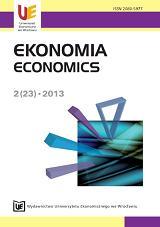Wokół osłabiania neoprotekcjonizmu rolnego unii europejskiej w ramach i poza WTO
Around the weakeningof the agricultural new protectionismof the European Union within and outside the WTO
Author(s): Zdzisław W. PuśleckiSubject(s): Economy
Published by: Wydawnictwo Uniwersytetu Ekonomicznego we Wrocławiu
Keywords: new protectionism; agricultural policy; the European Union; the WTO; liberalisation
Summary/Abstract: The main aim of the article is the presentation of the problem of the European Union agriculture new protectionism weakening within and outside the WTO. The specific objective was to show the consequences of EU agricultural new protectionism, its mitigation by the WTO to stimulate the development of commodity markets outside the WTO, new perspective aims of CAP as well as issues of sustainable development of European agriculture. Common external EU customs tariff applied selectively against selected goods, may limit the liberalisation of international trade. This is particularly highlighted by trading partners from countries not belonging to this European integration grouping and it is a sign of trade new protectionism. The resistance of the EU to cut tariffs for agricultural products has repeatedly blocked progress in WTO trade negotiations. In addition, developing countries show there is a new protectionism in agriculture justifying at the same time the use of barriers to imports and manufactured goods and services by the EU. Reducing EU selective external tariffs may be an important contribution to a liberal trading system, which provides high profits not only for the EU, but also an effective tool in the fight against global poverty. It is also important to emphasise a high level of subsidisation of the budget of EU agriculture, which seriously restricts the export capacity of the least-developed countries. The situation looks different in wealthier, developing countries, which paradoxically adopt similar measures used by the EU to increase financial subsidisation of own agriculture, which consequently affects the growth of falsification of world trade.
Journal: Ekonomia
- Issue Year: 2013
- Issue No: 23
- Page Range: 30-48
- Page Count: 19
- Language: Polish

